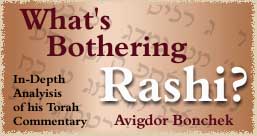

Back to this week's Parsha | Previous Issues
Parashas Korach
Last week (Parashas Shelach) we asked how Rashi could compare the sin of the spies to the sin of Miriam. An Answer: What was Miriam's sin? She spoke against Moses because he had taken a Cushite Woman. While Rashi and other commentaries say this woman was not really a Cushite, from a p'shat level of interpretation she was a Cushite. Meaning she was from Cush and was dark skinned (an offspring of Ham.). It would seem that she was critical of this woman because of her outer appearance - she was a Cushite, she was dark skinned. But if Moses choose her as a wife she certainly must have been a righteous woman, regardless of her outer appearance. However, Miriam judged by outward appearances and was critical of her brother because he took this woman as his wife. What was her punishment? "And behold Miriam became leprous WHITE AS SNOW." Miriam was now white on the outside even though she had sinned. White is the symbol of purity. She was white on the outside but on the inside she was a slanderer. Her outer appearance did not reflect a true state of purity. She was punished measure for measure. What was the sin of the spies? They had reported what they saw, but they judged exclusively by outward appearances. They drew incorrect conclusions based on what they saw - a strong people inhabiting the land of Canaan. They forgot that G-d had promised them they would inherit the land and as has been said "One and G-d is a majority." With G-d's help they could overcome the enemy (as in fact they did in Joshua's time.). In this crucial error they had not learned from Miriam's experience. For this reason Rashi compares the two cases. Notice Rashi's precise words in this first Rashi in Shelach. There he says "Because Miriam WAS SMITTEN because she spoke slander..." It was Miriam's measure-for-measure punishment that should have taught them the moral lesson. Unfortunately they didn't learn it. Now to this week's sedra. Korach. Numbers 17:23 "And it came to pass, on the morrow, that Moses came into the Tent of Testimony, and behold the staff of Aaron, of the house of Levi, blossomed, (Hebrew: "parach") yielded a flower ("perach") and brought forth buds and bloomed blossoms and ripened into almonds." RASHI "Yielded a flower" RASHI: take this literally.
What has Rashi told us? Of course we would take it literally, even if he said nothing. Why did he need to comment? An Answer: Next week, IY"H
Back to this week's Parsha | Previous Issues
|